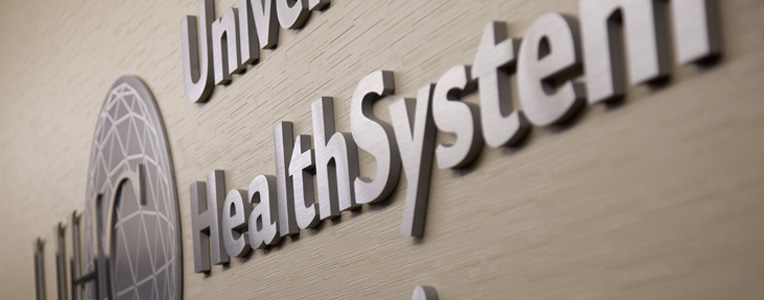The University HealthSystem Consortium (UHC) provides IT services and data storage to approximately 90% of the nation's non-profit academic medical centers, which involves using powerful databases for data management. Due to expedited growth, the storage requirements and storage costs were doubling every two years. UHC wanted to design a system that could keep up with this rapid and exponential growth, while providing flexibility for future challenges.

Customer
University HealthSystem Consortium (UHC)
Region
U.S.A.
Products & Services
Hitachi Universal Storage Platform V, Hitachi Dynamic Provisioning software
Industry
Alliance of academic medical centers and their affiliated hospitals
Release Date
March, 2011
Solutions By
Hitachi Vantara
The actual UHC system comprised of three components; StorageTek FLX280 to store data gathered from member hospitals, Microsoft® SQL Server as the primary database application, and 180 servers – out of which 25 percent were virtualized with VMware ESX.
Back in 2007, UHC network administrators acknowledged a strain on disk input/output (I/O), caused by detail level data mining and complex queries spanning multiple years. As the workload increased, their response times gradually decreased for members-facing reporting. While the frequent unplanned outages were observed, administrators realized that the UHC database size had been doubling every two years.
UHC’s goals for system overhaul included:
Don Naglich, UHC Director of technology infrastructure, and Steven Carlberg led a rigorous search process, which included exploring solutions from EMC, Hitachi Data Systems, HP, and IBM.
After three months of exhaustive research, site visits, and interviews with current clients of each provider, Naglich and Carlberg narrowed down the contenders to HP and Hitachi Data Systems. Though solutions offered by both companies appealed to UHC due to their capability for tiered storage through virtualization, UHC chose Hitachi Data Systems as they offered a superior service model with a key provision. Carlberg stated that Hitachi Data Systems was the only vendor out of all the contenders to put their uptime guarantee in writing. This assurance and excellent customer service response time distinguished HDS from other competitors under consideration.
Carlberg informed that one of the initial challenges was migrating from their existing storage vendor to the new HDS system, without disrupting the day-to-day operations of the legacy system. Besides, it was required for UHC team to learn operating the new equipment, and seamlessly transition between technologies.

By late January 2008, two Hitachi Data Systems consultants working with Carlberg and Haibin Cao, UHC’s senior network administrator, had installed the Hitachi Universal Storage Platform™ V. They successfully migrated data from member-facing applications on the existing StorageTek FLX280 system with minimal system downtime. During the migration, the consultants collected information on how UHC was using Microsoft SQL Server on the old system, which enabled them to recommend the optimal configuration for the Universal Storage Platform V before deployment. The overall UHC implementation involved:
The initial migration was performed with Hitachi ShadowImage® Heterogeneous Replication In-System Volume Mirroring software, and required an outage while switching from standard volumes to more efficient Hitachi Dynamic Provisioning volumes. This process was carried out without any downtime with the Hitachi Tiered Storage Manager software, which was available for non-disruptive migration of Dynamic Provisioning volumes immediately after the initial steps.
The Hitachi Data Systems consultants promptly accomplished the initial installation and remained available to assist, as needed with the Dynamic Provisioning software implementation. Hitachi also provided training to the UHC team members, who realized that maintaining the Universal Storage Platform V with Dynamic Provisioning software could be managed of their own.

The solution provided by Hitachi Data Systems to UHC involved Hitachi Universal Storage Platform V running Hitachi Dynamic Provisioning software. Carlberg and Cao were excited about the new solution’s promise to simplify storage management, optimize physical disk utilization, and enhance overall performance.
Until now, UHC’s existing provisioning layout and management scheme allowed the UHC team to use only 40 to 50 percent of UHC storage resources. With prior generations of storage systems, administrators had to use their own calculations. Sometimes, they had to balance the system load by manually assigning data volumes to array groups specific to physical disk spindle locations. The Hitachi Universal Storage Platform V with Hitachi Dynamic Provisioning software performs this task automatically and improves results.
The Dynamic Provisioning software by Hitachi Data Systems assigns physical capacity to some of large dynamic storage pools on the storage system, while additional capacity is added to the appropriate pool, when required. This reduces the task of storage administrators only to monitoring the capacity and performance of each pool. Applications are then assigned data volumes that use storage capacity on an as-needed basis. The data volumes use capacity evenly distributed across one of the dynamic pools.
By dynamically allocating the required physical disk space, Hitachi Dynamic Provisioning software minimizes the extra cost of over provisioning storage capacity, which otherwise is never used completely. The software also eliminates "hot spots" through wide striping – the distribution of data and I/O demand over the maximum number of disk drives and RAID groups. This reduces the burden of storage management and storage optimization from IT storage administrators, by enabling the system automatically balance load across several physical resources.
The results have been astounding for UHC:
*Source: University HealthSystem Consortium

Hitachi Data Systems provides best-in-class information technologies, services and solutions that deliver compelling customer ROI, unmatched return on assets (ROA) and demonstrable business impact. With a vision that IT must be virtualized, automated, cloud-ready and sustainable, Hitachi Data Systems offers solutions that improve IT costs and agility.
With over 4,500 employees worldwide, Hitachi Data Systems does business in more than 100 countries and regions. Hitachi Data Systems products, services, and solutions are trusted by world’s leading enterprises, including more than 70 percent of the Fortune 100, and over 80 percent of the Fortune Global 100. Hitachi Data Systems believes that data drives our world – and information is the new currency.

The University HealthSystem Consortium, Oak Brook, Illinois, formed in 1984, is an alliance of 112 academic medical centers and 256 of their affiliated hospitals representing approximately 90% of the nation's non-profit academic medical centers.
Providing the lens through which the organization assesses all it does, UHC's mission is to create knowledge, foster collaboration, and promote change to help members succeed. UHC’s vision of the future is to help members attain national leadership in healthcare by achieving excellence in quality, safety, and cost-effectiveness.
UHC offers an array of performance improvement products and services, such as powerful databases that provide comparative data in clinical, operational, faculty practice management, financial, patient safety, and supply chain areas. While programs, such as UHC's Imperatives for Quality and the UHC/AACN Nurse Residency Program™ offer opportunities for knowledge sharing and education, list servers allow country-wide members to share information and demonstrate the power of collaboration.







